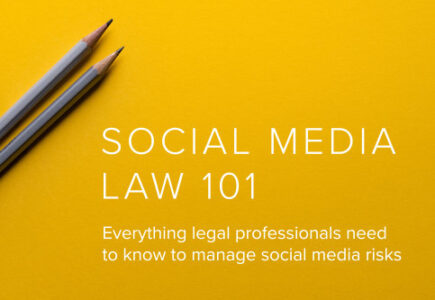Properly preserving social media evidence is key when it comes to having legal-grade, defensible data.
According to a 2019 study from Pew Research Center, 73 percent of all adults use YouTube, while 69 percent of all adults use Facebook. The numbers are lower for Twitter, LinkedIn and other social media platforms. Users on social media platforms freely share photos, life events and detailed narratives from their personal and professional lives, often in real-time. Moreover, much of this information is public and, therefore, fair game for social media evidence collection. However, there are provisions for digital evidence collection of private social media information as well as requirements for preserving social media evidence for discovery.
Social Media Discovery
Courts show a willingness to allow access to private social media profiles providing attorneys seeking such access can establish the relevance for the desired information. For instance, courts are likely to grant social media collection of evidence that contradicts disability claims – such as photos of an adverse party running a marathon. However, this does not grant a license for broad-based fishing expeditions: requests are typically time-limited and confined to specific social media posts. Likewise, attorneys seeking to limit access to private social media posts must demonstrate that such posts are irrelevant to the case at hand, or contain misleading or inaccurate information.
Preserving Social Media Evidence
ABA Model Rule 3.4 states that a “lawyer shall not unlawfully obstruct another party’s access to evidence or unlawfully alter, destroy, or conceal a document or other material having potential evidentiary value.” Increasingly, businesses in all industries are advised to capture and preserve potential website data for an online discovery request.
Social media diligence demands the proper preservation of social media evidence, including metadata and digital identification, both of which are essential for verification and authentication. For example, direct messages contain multiple metadata fields that can be sufficient to establish authorship. Therefore, attorneys should also advise clients against altering or deleting relevant posts and messages, as many social media platforms permanently delete the original versions of such data.
Consequences for deliberate failure to preserve social media evidence can result in stiff punishment, including sanctions for both the client and their counsel. This was the case in Lester v. Allied Concrete Co., No. CL08-150 (Va. Cir. Ct. Sept. 01, 2011), aff’d, No. 120074 (Va. Ct. App. Jan. 10, 2013), where an attorney directed a paralegal to “clean up” his client’s Facebook page by deleting 16 photos and deactivating the account.
Best Practices for Evidence Preservation
Courts have routinely distinguished between “private” and “not public” – applying the latter status to social media posts. As such, best practices concerning evidence preservation for social media posts dictate adopting a policy ensuring proper maintenance of social media information. This policy includes advising clients against deleting social media information that may be included in online discovery requests. In addition, such policies can protect clients and attorneys from harsh punishments for failure to properly maintain digital evidence.
SMI Aware has proprietary technology capable of executing sophisticated digital forensics to handle high-volume discovery and analysis. Our independent in-house analysts use their expertise and our proprietary software to perform thorough data collection and analysis to provide consistent, accurate results.
Ready to make your open-source evidence defensible? Contact SMI Aware to learn more about how we can help you with your social media and open-source evidence collection.




